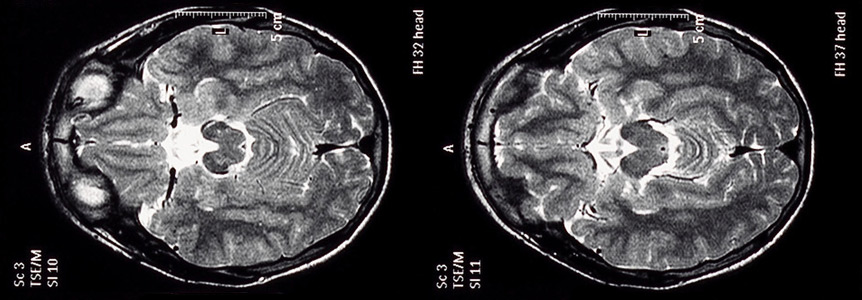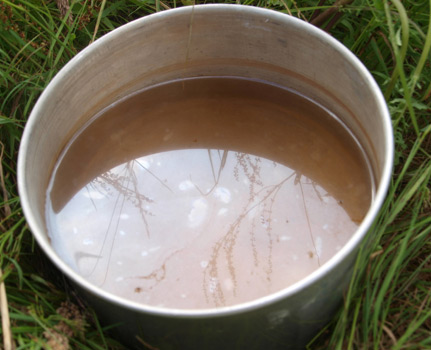In 1981, a scientist named N. J. Van Haeringen did a study on the human body and mental health. He found that human “tears have thirty times the amount of manganese than is found in blood” and that “concentrations of manganese have also been found in the brains of chronic depressives after their deaths.” He even theorized that people could literally cry the manganese from their bodies in order to reduce depression.
Manganese, a naturally-occurring element found in everything from the air to drinking water, is an essential nutrient for humans. It is known, however, that too much of this element could have dire health effects.

Manganese can have adverse health effects on the human brain.
Similarities To Parkinson’s
While Haeringen’s conclusions remain theoretical, excessive Manganese in the body is proven to cause symptoms eerily similar to Parkinson’s Disease, a progressive disorder of the nervous system. In fact, Maganism is so similar to Parkinson’s Disease (PD) that it is often misdiagnosed early on. Both Parkinson’s patients and those with Manganism have symptoms which include: slurred speech, a tottering gait, rigid muscles, increased likelihood of falling, facial masking, tremors and drooling. According to The Economist, Dr. Brad Racette even theorized that the two may be connected and is conducting studies to try and assess the correlation between miners exposed to high levels of manganese and the onset of PD.
Both Parkinson’s patients and those with Manganism have symptoms which include: slurred speech, a tottering gait, rigid muscles, increased likelihood of falling, facial masking, tremors and drooling.”
While a lot of the talk surrounding Manganism focuses on inhaled Manganese particles, concern regarding the potential impact of the element in drinking water has only grown. Researchers have called for a reassessment of current guidelines regarding the amount in tap water. The Environmental Health Perspectives published an article as early as 2007 titled: “Time to Re-evaluate the Guideline Value for Manganese in Drinking Water?”

Some researchers have even expressed concern about the possibility of Manganese begin inhaled via shower steam.
Manganese Health Effects
Manganism is not the only risk when it comes to Manganese in drinking water. Some research suggests that exposure to the element via drinking water could cause lower IQ in children and even changed behaviors. Unfortunately, children can’t cry away permanent brain effects.
According to a study of 8-12 year old children in Bangladesh (where, in certain areas, high concentrations are found in drinking water):
“Evidence of neurological, cognitive, and neuropsychological effects of manganese (Mn) exposure from drinking water (WMn) in children has generated widespread public health concern. At elevated exposures, Mn has been associated with increased levels of externalizing behaviors, including irritability, aggression, and impulsivity. Little is known about potential effects at lower exposures, especially in children. Moreover, little is known regarding potential interactions between exposure to Mn and other metals, especially arsenic (As).”
The same study expressed concern about the impact of manganese in drinking water on small children stating, “These observations reinforce the growing concern regarding the neurotoxicologic effects of WMn in children.” Echoing the conclusions of Dr. Maryse F. Bouchard, of the University of Montreal who insisted that “more research was necessary to understand the mechanisms by which manganese present in water might be neurotoxic for children.”
It Doesn’t Just Turn Water Brown
The United States Geological Survey in 2011 found that 11 % of United States domestic wells had a relatively high concentration of manganese.
A fact sheet provided by the University of Massachusetts center for Agriculture, Food and the Environment states that iron and manganese are commonly found in high concentrations naturally, and are thus often present in private wells. The fact sheet further explains that in deep wells where oxygen is low, manganese won’t make itself known until it’s exposed to more oxygen. When oxidation occurs, it can cause a whole host of problems including clogged pipes, increased energy costs, and poor water quality.
Oxidized manganese can also interact with tannins in coffee and tea causing it to turn into a nasty black sludge. It also tends to be super gross looking and tough to drink (as seen in the bucket).
Another problem well owners encounter when there’s too much manganese, is the formation of manganese bacteria. These bacteria, which feed on iron and manganese, can form slime in toilet tanks and clog drains and pipes as well as stain appliances, clothing and more.
Whether an over exposure to Manganese results in sludge, depression, or more serious brain effects, the conclusion is the same. Tears are shed over too much Manganese— and with scientists concerned about current guidelines, it’s a “better safe than sorry” situation. The best way to protect yourself and your family from being exposed to too much Manganese in drinking water is to filter it using a point of use drinking water filter.
